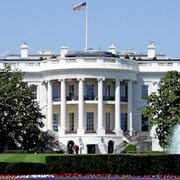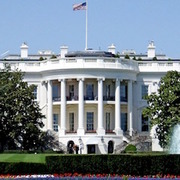tv
 Trump Administration
Trump Administration
Archive
U.S. House of Representatives CSPAN April 14, 2010 7:35pm-7:43pm EDT
Archive
7:35 pm
subject starting with jeff sessions, the top republican on the judiciary committee. >> with regard to the khalid shekh mohammed decision, you made that decision you declared in this committee directly that it was going to be tried in new york and you defended that as a -- as an appropriate way. it caused quite a bit of controversy at the time. i understand now the white house has suggested it would not be tried in new york and i guess it makes me a bit uneasy, having served in the department, to have politicians discussing where the cases ought to be tried. that's normally the department of justice and professional prosecutors. what's your position about where these -- where khalid sheikh mohammed trial should
7:36 pm
take place and are you uneasy that the white house is leaking statements about where a criminal case should be taken for trial? >> i'm not sure there have been leaks. i have said myself that the national security team is in the process of reviewing where the case might best be held. we have to take into consideration in making -- >> who is the national security team? >> the national security team includes the secretary of defense, the secretary of state, people from the intelligence community, the people who meet with the president every tuesday afternoon to review where we stand around the world with regard to our terrorist efforts. this is a trial that is unique in the sense that it does involve very real national security corns and i think the involvement of the white house and the national -- the national security component of the white house as well as the national security team in tepping -- helping make that determination makes sense. i'm jealous in guarding the
7:37 pm
prerovetives of the department. >> i think you should be. i was a little -- i would expect normally if it's under reconsideration that the attorney general should announce it's you should reconsideration and not politicians. but there is a venue problem, is it not, if it's the case is try in civilian courts. but if it's tried by military commission, you're not limited in that way. so aren't -- to try in illinois, wouldn't that raise venue issues, for example. >> you're obviously a former united states attorney, and the question you asked is one i asked. if there were the possibility that ewe moved this trial, what would the possible venues be? i have received from the people who i asked that question a list of places in which the
7:38 pm
case could be tried. what i will say is the southern district of new york is, for instance, a much larger place than simply manhattan. there's the possibility of trying the case in other venues beyond new york. >> well, i just think that the simple -- simpler and more logical decision would be to reconsider fundamentally and try this case where it should be, i think, in military commissions. isn't it true that protecting of classified information that can be revealed in a criminal trial is a priority of our government, in other words, we don't want to have a trial develop in such a way that classified information is revealed to the public and on march 20, this year, your department answered questions i submitted to them about the
7:39 pm
danger of revealing classified information and the relevancey of that to criminal or military commissions. you testified there was not much difference but the march 20 responses from your department really tell a different story, citing, quote, key differences in classified evidence protections and military commissions trials that are not present in federal criminal law. were you aware of these -- this information when you testified before us in november? >> yeah, i don't necessarily agree that there are fundamental differences between the protections available in civilian courts and those that might be available in military commissions. the military commissions modifications that have been made to the secrecy provisions really codify, i think, what judges do as a -- as a matter of routine in civil court, with
7:40 pm
one exception that morning has to do with interlocutory appeals which i think is a good idea and should be incorporated into what we do on the civilian side. much of the other enhancements that you see reflect what judges do on the civilian side. >> well, that's not what your responses say. they list seven different examples of how the military commissions are more effective in protecting intelligence sources and methods than a criminal cyle. do you dispute that? >> i think that those seven instances, i'll take your word for it that that's the number, but the instances that are listed, as i said, reflect the kinds of things that judges do, not because they are obligated to do them by rule or statute but because they do them in the way in which they interpret the cepa statute. s i said, i do think the one
7:41 pm
modification, enhancement, that exists with regard to military commissions with regard to interlocutory appeal is something we should consider. we should always be looking at the cepa stat to make it more effective. >> i agree with that but i would say to you, mr. holder, that when you try a person in civilian court, you have to give them miranda warning upon taking them into custody. you have to tell them they're entitled to a lawyer, they're entitled to a speedy trial, they're entitled to file discovery of the government's case, all immediately, basically. and when you try them, hold them in military custody, you don't have to charge them at all because they're a prisoner of war until the war is over but if they violated the laws of war and committed criminal acts, they may be tried, if you choose to try them in military commissions. it just makes perfect sense to
7:42 pm
me that these cases would be tried there, that's the result of the national consensus after the 9/11 commission issued their report, congress has passed legislation to that effect and the president, one of his first acts was to set aside and stop these commissions and you have blocked their progress since then, it seems to me. so i think you need to re-evaluate this. i don't think the people of new york want this trial anywhere in their state or their city or the southern district. there are many legal questions that will arise, i just hope you'll re-evaluate this. apparently the white house is, i hope you will, and we will soon have clarity about what the possibility of the department of jusity is. >> the decision i made and the decisions i will make with regard to the placement of any of these trials depends on what is best for the trial. do this on a case bicase basis
7:43 pm
with regard to the evidence we would seek to commit, concerns about some of the evidence that might be admitted depending on the forum, the impact of the usage of certain intelligence on -- certain evidence on the intelligence community and what it might do for our ability to interact with our allies, there are a whole variety of concepts and things that have to be taken into consideration and what i have tried to do and what we will try to do is make these decisions on a case-by-case basis with the aim of being most effective in a particular trial in protecting the american people. >> thank you, senator
42 Views
IN COLLECTIONS
CSPAN Television Archive
Television Archive  Trump Administration
Trump Administration  Television Archive News Search Service
Television Archive News Search Service  Executive Branch Archive
Executive Branch Archive 
Uploaded by TV Archive on

 Live Music Archive
Live Music Archive Librivox Free Audio
Librivox Free Audio Metropolitan Museum
Metropolitan Museum Cleveland Museum of Art
Cleveland Museum of Art Internet Arcade
Internet Arcade Console Living Room
Console Living Room Books to Borrow
Books to Borrow Open Library
Open Library TV News
TV News Understanding 9/11
Understanding 9/11







